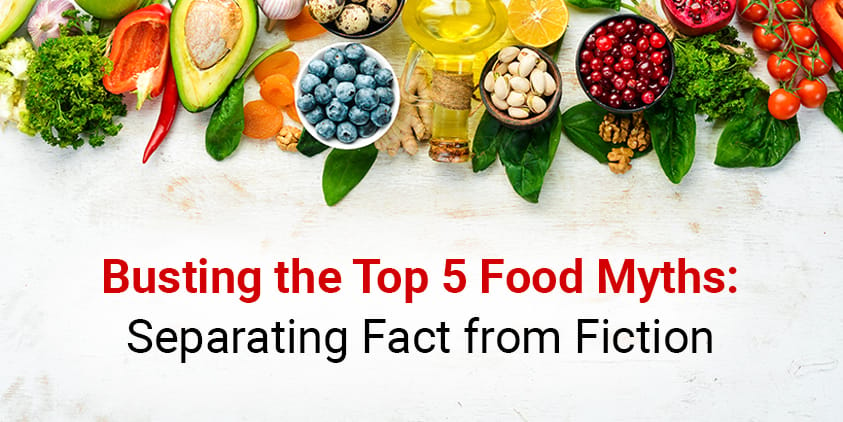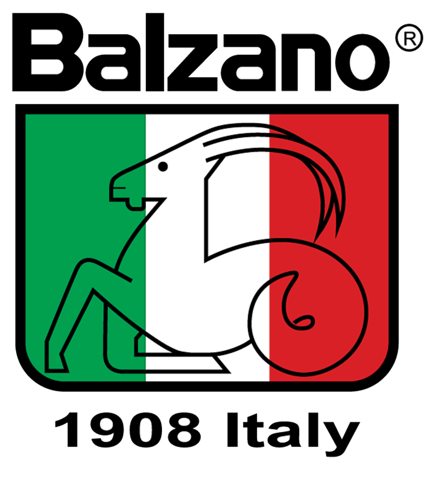BUSTING THE TOP 5 FOOD MYTHS SEPARATING FACT FROM FICTION

Food myths have been circulating for generations, often passed down as gospel truths without any scientific basis. These myths can lead to confusion and misguided dietary choices. In this blog, we'll unravel the top five food myths that have persisted over the years and present the scientific evidence to debunk them. It's time to set the record straight and make informed decisions about what we put on our plates.
Myth: Carbs are the Enemy
One of the most pervasive food myths is that carbohydrates are the enemy of a healthy diet. Carbs have been vilified, leading to the rise of low-carb and keto diets. While it's true that excessive consumption of refined carbohydrates can lead to weight gain and other health issues, not all carbs are created equal.
Complex carbohydrates found in whole grains, fruits, and vegetables are essential sources of energy and provide essential nutrients like fiber, vitamins, and minerals. These are beneficial for maintaining a healthy weight, supporting digestion, and reducing the risk of chronic diseases. Moderation and choosing the right sources of carbohydrates are key to a balanced and nutritious diet.
Myth: Skipping Breakfast is Healthy for Weight Loss
The notion that skipping breakfast can aid in weight loss has gained popularity in recent years. The idea behind it is that by fasting in the morning, the body burns more fat. However, research has shown that skipping breakfast may lead to overeating later in the day and can negatively impact overall health.
A balanced breakfast is crucial for kickstarting metabolism, providing energy, and improving cognitive function. Skipping breakfast can disrupt the body's natural rhythm and lead to unhealthy eating habits. Instead of skipping breakfast, opt for a nutrient-rich meal that includes a mix of protein, fiber, and healthy fats to keep you feeling fuller for longer.
Myth: "Detox" Diets Cleanse the Body
The concept of "detoxing" through restrictive diets or juice cleanses has become trendy in the wellness industry. Proponents claim that these diets help the body eliminate toxins and promote weight loss. However, there isn't much reliable scientific evidence to support these claims.
The human body is equipped with a sophisticated detoxification system involving the liver, kidneys, and digestive tract. Detox diets may lead to nutrient deficiencies and disrupt the body's natural balance. Focus on adopting a balanced diet full of nutritious foods, staying hydrated, and assisting your body's natural detoxification processes rather than using drastic measures.
Myth: Organic Food is Always Healthier
The organic food market has seen exponential growth due to the perception that organic equals healthier. Organic produce is grown without synthetic pesticides and fertilizers, which can be beneficial for the environment and may reduce exposure to certain chemicals. However, the belief that organic food is inherently more nutritious is a myth.
Studies comparing organic and conventionally grown foods have shown minimal differences in nutrient content. Both types of produce can be part of a healthy diet. The key is to prioritize fruits and vegetables in your diet, regardless of their organic status, as they offer a wide array of essential nutrients and antioxidants.
Myth: Eating Fat Makes You Fat
The fear of dietary fat and its association with weight gain has been deeply ingrained in our minds. However, not all fats are harmful, and some are actually essential for good health. Fats are an important source of energy, aid in nutrient absorption, and support various bodily functions.
The focus should be on differentiating between healthy fats (found in avocados, nuts, and olive oil) and unhealthy trans fats (found in processed and fried foods). When consuming fats, moderation is essential. Consuming healthy fats as part of a balanced diet can even help with weight management and reduce the risk of heart disease.
The key takeaway is to prioritize whole, nutrient-rich foods while understanding that one-size-fits-all approaches to nutrition rarely work. It's always best to consult with a registered dietitian or healthcare professional to tailor your diet to your specific needs and goals. By busting these top five food myths, we can pave the way for a healthier and more enjoyable relationship with food.
Leave a Comment
Popular Posts
Est. in 1908 in Italy, Balzano has evolved as a quality brand over last 110+ years. With Italian craftsmanship and Italian design team we wish to fill our customers life with healthy living, style and convenience globally.
MATRIX TRADE CONNECT LLP
Paradise cinema, 1ST Floor, Plot 305, Delta Apt, LJ Road,
Mahim West, Mumbai,
Maharashtra 400016
IN





0 Comment